AP心理学易混淆词汇
最全心理学专业词汇
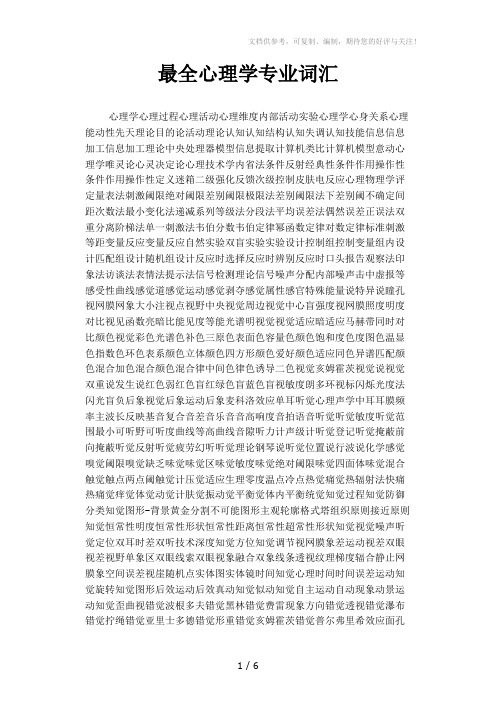
最全心理学专业词汇心理学心理过程心理活动心理维度内部活动实验心理学心身关系心理能动性先天理论目的论活动理论认知认知结构认知失调认知技能信息信息加工信息加工理论中央处理器模型信息提取计算机类比计算机模型意动心理学唯灵论心灵决定论心理技术学内省法条件反射经典性条件作用操作性条件作用操作性定义迷箱二级强化反馈次级控制皮肤电反应心理物理学评定量表法刺激阈限绝对阈限差别阈限极限法差别阈限法下差别阈不确定间距次数法最小变化法递减系列等级法分段法平均误差法偶然误差正误法双重分离阶梯法单一刺激法韦伯分数韦伯定律幂函数定律对数定律标准刺激等距变量反应变量反应自然实验双盲实验实验设计控制组控制变量组内设计匹配组设计随机组设计反应时选择反应时辨别反应时口头报告观察法印象法访谈法表情法提示法信号检测理论信号噪声分配内部噪声击中虚报等感受性曲线感觉道感觉运动感觉剥夺感觉属性感官特殊能量说特异说瞳孔视网膜网象大小注视点视野中央视觉周边视觉中心盲强度视网膜照度明度对比视见函数亮暗比能见度等能光谱明视觉视觉适应暗适应马赫带同时对比颜色视觉彩色光谱色补色三原色表面色容量色颜色饱和度色度图色温显色指数色环色表系颜色立体颜色四方形颜色爱好颜色适应同色异谱匹配颜色混合加色混合颜色混合律中间色律色诱导二色视觉亥姆霍茨视觉说视觉双重说发生说红色弱红色盲红绿色盲蓝色盲视敏度朗多环视标闪烁光度法闪光盲负后象视觉后象运动后象麦科洛效应单耳听觉心理声学中耳耳膜频率主波长反映基音复合音差音乐音音高响度音拍语音听觉听觉敏度听觉范围最小可听野可听度曲线等高曲线音隙听力计声级计听觉登记听觉掩蔽前向掩蔽听觉反射听觉疲劳幻听听觉理论钢琴说听觉位置说行波说化学感觉嗅觉阈限嗅觉缺乏味觉味觉区味觉敏度味觉绝对阈限味觉四面体味觉混合触觉触点两点阈触觉计压觉适应生理零度温点冷点热觉痛觉热辐射法快痛热痛觉痒觉体觉动觉计肤觉振动觉平衡觉体内平衡统觉知觉过程知觉防御分类知觉图形-背景黄金分割不可能图形主观轮廓格式塔组织原则接近原则知觉恒常性明度恒常性形状恒常性距离恒常性超常性形状知觉视觉噪声听觉定位双耳时差双听技术深度知觉方位知觉调节视网膜象差运动视差双眼视差视野单象区双眼线索双眼视象融合双象线条透视纹理梯度辐合静止网膜象空间误差视崖随机点实体图实体镜时间知觉心理时间时间误差运动知觉旋转知觉图形后效运动后效真动知觉似动知觉自主运动自动现象动景运动知觉歪曲视错觉波根多夫错觉黑林错觉费雷现象方向错觉透视错觉瀑布错觉拧绳错觉亚里士多德错觉形重错觉亥姆霍茨错觉普尔弗里希效应面孔识别原型说特征觉察器随意注意有意识注意分配性注意注意广度注意分配注意转移通道容量衰减模型早期选择模型加工水平并行分布加工模型系列加工系列搜索自下而上加工表象视觉表象想象表象心理扫描再造想象随意想象记忆记忆系统记忆搜索两种记忆说次级记忆视觉记忆声象记忆情景记忆陈述性知识非陈述记忆语义记忆形象记忆内隐记忆三种记忆系统遗觉象部分报告法短时记忆组块工作记忆语义差别法激活扩散层次网络模型命题表征感觉登记自动编码语义编码双重编码说有意识记关键词识记法记忆术保持性复述再现再认广度语义启动回忆顺序回忆系列位置曲线回忆法重建法首因效应顺序效应联想记忆联想心理学因果律对比律联想值控制联想即时联想临近联想对比联想联想网络模型保持遗忘动机性遗忘遗忘曲线倒摄抑制倒摄干扰痕迹理论干扰理论记忆分子理论约斯特定律蔡加尼克效应语言语言相对性语言心理学神经语言学言语心理学言语知觉言语生成内部言语出声语言书面言语身体语言手指语本族语第二语言双语易读性理解间接理解语调模式眼音距词优势效应句子成分上下文效应复杂性派生理论生成语义学表层结构转换规则短语结构语法谓词交叉模型图式理论故事语法内部表征自然概念词概念空间概念析取概念概念习得概念发展概念储存概括类比过滤式分析假设检验说分段策略继时性扫描保守性聚焦沃夫假设直接判断三类判断决策树推理归纳推理间接推理无意识推理思维思维过程具体思维联想性思维原始思维创造性思维辐合思维无形象思维出声思维集中性沉思顿悟思维流畅性问题解决问题表征迂回问题手段-目的分析启发法口语记录心理定势功能性解决形式运思技能动作速度动作灵活性不随意运动练习练习曲线天花板效应高原期文森特曲线交叉迁移回避性训练镜画触棒迷津纸笔迷津情绪反应应激达尔文情绪说表情三维模式情感理智感美感需要第一需要动机冲动成就动机正诱因动机本能说高级心理过程个人倾向性人差方程爱好期望理想心境信念素质能力倾向智力气质类型胆汁质抑郁质希波克拉底体液说性格学外向中间性格整体论类型论人格人格结构地位人格场依存性人格理论斯泰尔-克劳福德效应马尔计算理论总体抽样随机抽样分层抽样连续变量因变量参数描述统计集中量数加权平均数几何平均数众数差异量数离差方差标准差标准分数相关负相关散点图积差相关斯皮尔曼等级相关肯德尔一致性系数二列相关小概率事件二项分布正态曲线双峰分布统计分析参数估计极大似然法无偏估计量置信限拒绝域统计显著性假设检验虚无假设检验能力单尾检验临界值同质性费希尔Z转换处理均方单因素方差分析析因设计方差分析交互作用邓肯多重范围检验协方差分析独立性检验校正数多元分析线性关系多元回归逐步回归分析剩余标准差因素负荷相关矩阵聚类分析贝叶斯定理中数检验法威尔科克森符号秩次检验心理测量学测验法特质心理量表顺序量表比率量表团体测验操作测验文化公平测验速度测验智力测验智商比率智商情境测验项目选择客观测验多项选择法填充测验正误题标准化测验时限常模测量误差评定者误差双盲项目分析项目区分度信度再测信度等值复本分半信度概化理论内容效度构想效度区分效度实证效度同时效度交叉效度分析项目反应理论项目特征函数测验特征函数测验分数标准九分间接测量导出分数常模参照测验能力倾向测验学业成就测验兴趣测验主题统觉测验墨迹测验评定量表韦克斯勒儿童智力量表雷文推理测验区分能力倾向测验教师自编测验十六种人格因素问卷贝利婴儿发展量表格塞尔发展测验丹佛儿童发展筛选测验纳格尔图片测验家庭调查表心理物理量表神经心理测验艾森克人格问卷职业能力倾向测验斯特朗-坎贝尔兴趣调查表罪犯心理测验心理学史心理学系统观马克思主义心理学心理现象系统认识论二元论心身相互作用论副现象论理性心理学白板说联想主义元素主义心理主义心理现象要素官能心理学差异心理学心理化学生物主义反射学颅相学中枢论决定论原则文化决定论文化历史心理学意向论互动论思维边缘理论沙赫特情绪实验构造心理学内容分析屈尔珀学派形质学派顿悟说心身同型论场论心理场向量心理学心理生活空间机能主义芝加哥学派动力心理学奥地利学派联结主义心理学摩尔根法则行为主义目的行为主义操作性行为方法学行为主义南锡学派精神分析力比多下意识集体无意识新精神分析策动心理学认知革命需要层次论现象心理学超个人心理学生理心理学生物心理学心理神经免疫学社会生物学大脑皮层功能等位说高级神经活动规律反射弧条件性免疫两种信号系统学说第二信号系统非联想性学习奇偶问题学习延缓交替反应穿梭箱印记操作性攻击印迹长时程增强效应帕佩兹环路定向反应自我刺激摄食调节摄食中枢生理机制代偿先天释放机制昼夜节律动物心理学比较认知回避学习动物交往探究行为理毛行为习得行为繁殖行为社会昆虫物种特异行为领地行为攻击行为动物求偶行为争胜行为迂回行为行为遗传学行为矫正乞求育嗣行为习性学动物早期经验分化本能敏感期动物工具使用神经心理学电痉挛休克剥夺电解损伤区域性脑血流中枢神经系统前脑大脑两半球左半球小脑大脑皮质白质额叶运动前区布罗卡区听觉区顶叶枕叶视觉皮质联合纤维海马结构嗅觉区杏仁核内侧前脑束连合纤维基底神经节丘脑视交叉上核腹内侧下丘脑脑垂体锥体外系统四叠体内侧膝状体核耳蜗神经核神经神经纤维神经再生脑神经嗅神经三叉神经交感神经系统周围神经系统脑脊液磁共振成象脑磁图描记术显微放射自显影术神经计算稳定电位脑电图描记器脑电图自发电位去同步化波诱发电位早成分事件相关电位顶正波运动关联电位睡眠中枢快速眼动睡眠桥膝枕峰网状激活系统脑机制抑制突触后抑制整合神经元简单细胞超复杂细胞动作电位膜电位极化全或无定律活动依存性强化机制树突突触可塑性兴奋性突触后电位同源性突触抑制突触囊泡感受野空间频率柱光感受器视杆细胞视紫红质视紫蓝质眼球辐辏运动跟随运动闸门控制理论化学感受器乙酰胆碱多巴胺受体垂体生长素靶细胞外激素内分泌腺肾上腺性腺睾丸素胰岛素内啡肽脑啡肽拮抗物染色体基因核酸脱氧核糖核酸神经毒素促智药莫罗反射吮吸反射肛门期胚胎新生儿期童年期少年期青春期婴儿天才儿童残障儿童问题儿童老年心理学发生心理学构造论毕生发展观生长种系发生关键期发展水平发展阶段青少年发育徒增最近发展区社会化适应实足年龄先天属性转换本能行为游戏儿童精神病个案研究临床法日记法血缘关系研究纵向设计连续系列设计习惯化喔啊声电报式言语前运思阶段形式运思阶段守恒滞差自我中心内化互反性象征能力分类液态智力阅读准备低常儿童才智儿童他律道德后习俗道德道德两难自我概念性别差异性别角色认同恋母情结专制型父母宽容型父母核心家庭领养婴儿期创伤亲和陌生人焦虑社交能力同层人假想的观众排便训练实验社会心理学社会关系社会意识社会规范传统心理群体现行性原则跨文化研究现场实验访谈角色规范角色行为角色适合性角色冲突角色紧张性别角色社会化社会动机社会知觉印象形成第一印象社会自我自我知觉归因偏向海德归因理论三维度理论责任归因因果性归因态度态度改变态度理论认知和谐偏见吸引力心理相容人际关系人际排斥人际沟通边际人男性化社会定型从众群体压力米尔格拉姆服从实验说服依从时尚利他主义助人行为社会交往社会强化社会愿望社会适应回避行为内疚动机性选择责任扩散旁观者效应沟通模式大众传媒沟通网络孤独竞争个人空间平衡理论人际吸引理论社会交换理论认知相符理论对象-关系学说符号学习理论大群体外群体标准群体非正式群体群体行为群体思维群体决策凝聚力群众心理学群众行为群际行为网络社会心理学社会感染社会压力社交图学习心理学德育心理学学科心理学教育社会心理学学习的联结说学习律效果律相属律学习的习惯说近因律全或无学习潜伏学习工具性学习学习的场论认知-同化说学习学习过程学习曲线学习的反馈学习类型系列学习言语学习偶然学习直觉学习有目的的学习认知学习意义学习学习测量学习效果学习系数学习准备学习内驱力学习的外在动机学习态度替代强化特殊迁移共同要素说知识的掌握知识的巩固概念学习规则学习肯定例证智力技能智力活动的内化学习方法操作技能动作示范集中学习分散学习品德心理结构道德需要道德行为能力差异学习障碍学习困境布鲁纳教学原则自学辅导群体教学计算机辅助教学直线式程序课堂纪律课堂心理环境教师期望效应医学心理学临床心理学护理心理学康复心理学社区心理学心理病理学生物医学模式国际疾病分类社会医学病因学心理社会因素潜伏期创伤急性心因性反应综合征评估机体觉缺失注意障碍认知障碍记忆减退遗忘综合征妄想关系妄想嫉妒妄想继发性妄想定向力幻觉机能性幻觉假性幻觉假性痴呆情感高涨心境障碍情感淡漠兴趣缺失焦虑特质焦虑欣快挫折积极关注意志缺失谵妄健全人格病态人格反社会人格多重人格人格类型内向人格者人格解体人格特质最佳人格特质人格障碍回避型人格障碍强迫型人格障碍依赖型人格障碍分裂型人格障碍表演型人格障碍精神病神经质情结本我真实自我心理动力学孤独症行为障碍酒精依赖慢性酒精中毒分离综合征药物滥用药物中毒戒瘾戒断综合征轻微脑功能障碍生活方式生活方式疾病应激性生活事件应激状态应激应付策略应激反应控制社会再适应冲突精神创伤心身医学心身疾病更年期综合征失认症失语症韦尼克失语症命名性失语症视觉失认症词盲失读症阅读障碍失音症失用症书写困难结构性失用症大脑两半球功能不对称性左利手偏侧化中枢神经系统障碍出生创伤心理疾病心理障碍急性精神错乱急性精神分裂症单纯型精神分裂症紧张型精神分裂症轻躁狂躁狂症情感性精神病偏执狂反应性精神病器质性精神病中毒性精神病痴呆血管性痴呆进行性遗忘克汀病激越性抑郁症神经症强迫观念焦虑性神经症癔症诈病恐怖症心理治疗集体心理治疗非言语心理治疗分析性心理治疗短程心理治疗阿德勒心理治疗人本主义心理治疗存在主义心理治疗认知疗法合理情绪疗法系统脱敏厌恶疗法放松疗法舞蹈疗法家庭治疗失眠催眠疗法音乐疗法冲击疗法森田疗法暗示性塑造法开放性访谈精神药物抗抑郁药物抗精神病药致幻剂安慰剂咨询者热线治疗者来访者中心疗法反向移情电休克治疗对抗性条件作用解释健康保健整体健康社区心理卫生中心应付应付技能训练一级预防三级预防自我实现社会支持替代投射合理化作用防御机制压抑自欺否认躯体虐待性偏离施虐癖露阴癖异装癖同性恋假两性畸形催眠恍惚状态睡行症发作性睡病恋童症纵火狂工业心理学认知工效学人机系统评价人机对话人机功能分配人的因素人的可靠性人的传递函数闭环控制追踪尾随追踪刺激维度信息反馈动态显示视觉编码视觉显示器电子显示器多功能显示器信号灯告警信号听觉编码触觉显示控制器控制器阻力控制-显示兼容性中央控制室链分析训练器培训评估心理负荷负荷应激信息超负荷觉察时间照明效应光源显色性噪声效应振动振动效应高温操作温度习服失重缺氧人体测量学航空航天心理学航空心理学环境心理学技术美学仿生学管理心理学管理信息系统科学管理原理目标管理人力资源管理方格公平理论成就需要理论霍桑效应管理决策任务分析职务分类群体训练内在激励付酬制度绩效评价领导领导行为连续体领导特质理论正式群体官僚机构组织设计组织发展组织变革工业社会心理学劳动心理学工作效率工作姿势工作热量工作丰富化工作评价弹性工作时间操作合理化单调作业疲劳曲线肌肉疲劳动作与时间研究安全心理学安全标准安全评价人为失误事故倾向故障树分析职业心理学职业指导职业选择人员选拔法制心理学法律心理学立法心理学诉讼心理学犯罪心理痕迹审讯心理学律师心理学审判心理学刑罚威慑力供述动机证言心理学证据辨认守法心理学犯罪理论聚合效应论犯罪人格犯罪行为犯罪目的激情犯罪青春期危机犯罪预测矫治心理学罪犯角色偏差罪犯挫折反应罪犯群体动力罪犯心理档案回归心理学体育心理学运动技能学习开放性运动技能动作感觉器械感场地感速度感水感运动表象操作思维动作练习曲线反应类型竞赛心理运动情绪运动竞争情绪激变模型认知性焦虑运动焦虑症比赛心理定向失败定向克拉克现象比赛型运动员心理耗竭心理战术战术思维赛前心理状态赛前盲目自信状态赛前心理准备赛后心理调整最佳唤醒水平运动顶峰体验心理技能训练念动训练内部表象注意控制训练结果性目标自信心训练动机训练自生放松三线放松自我暗示模拟训练运动成瘾主场优势工具性攻击教练员指导方式运动心理诊断滑动模型应用心理学战士心理学特殊环境心理学战斗疲劳宣传妇女心理学商业心理学广告设计消费心理学购买决策购买意识购买过程消费行为消费者消费者行为消费者研究消费水平旅游心理学艺术心理学视觉艺术表现艺术文艺心理学艺术冲动艺术欣赏音乐心理学音乐感受性音乐盲音乐才能宗教心理学。
心理学英语词汇大全揭秘心理学术语深入了解人类思维与行为
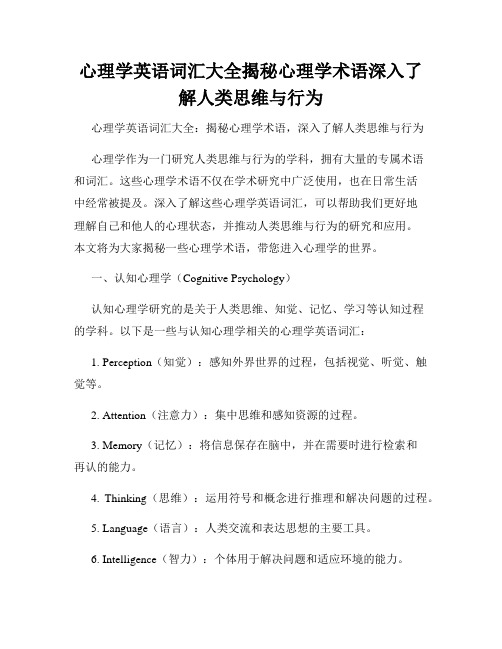
心理学英语词汇大全揭秘心理学术语深入了解人类思维与行为心理学英语词汇大全:揭秘心理学术语,深入了解人类思维与行为心理学作为一门研究人类思维与行为的学科,拥有大量的专属术语和词汇。
这些心理学术语不仅在学术研究中广泛使用,也在日常生活中经常被提及。
深入了解这些心理学英语词汇,可以帮助我们更好地理解自己和他人的心理状态,并推动人类思维与行为的研究和应用。
本文将为大家揭秘一些心理学术语,带您进入心理学的世界。
一、认知心理学(Cognitive Psychology)认知心理学研究的是关于人类思维、知觉、记忆、学习等认知过程的学科。
以下是一些与认知心理学相关的心理学英语词汇:1. Perception(知觉):感知外界世界的过程,包括视觉、听觉、触觉等。
2. Attention(注意力):集中思维和感知资源的过程。
3. Memory(记忆):将信息保存在脑中,并在需要时进行检索和再认的能力。
4. Thinking(思维):运用符号和概念进行推理和解决问题的过程。
5. Language(语言):人类交流和表达思想的主要工具。
6. Intelligence(智力):个体用于解决问题和适应环境的能力。
二、社会心理学(Social Psychology)社会心理学研究的是人类在社会环境中的思维、感知、行为等。
下面是一些与社会心理学相关的心理学英语词汇:1. Social interaction(社会互动):人与人之间的交流和相互作用。
2. Attitude(态度):个体对特定对象或问题的评价。
3. Stereotype(刻板印象):对特定群体的固定而简化的看法。
4. Prejudice(偏见):基于刻板印象而产生的对他人的不公平或负面评价。
5. Group dynamics(群体动力学):研究群体中个体相互影响的过程。
6. Conformity(从众):个体基于群体压力而改变自己的行为或观点。
三、发展心理学(Developmental Psychology)发展心理学研究的是人类在不同年龄阶段的身心变化和发展规律。
心理学名词——精选推荐
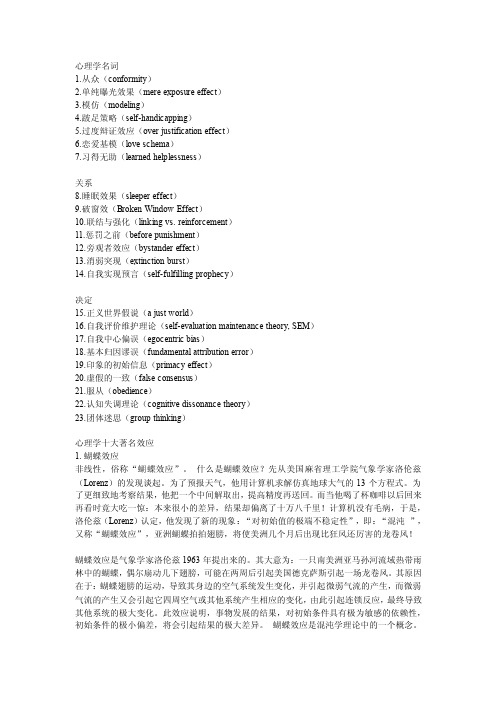
心理学名词1.从众(conformity)2.单纯曝光效果(mere exposure effect)3.模仿(modeling)4.跛足策略(self-handicapping)5.过度辩证效应(over justification effect)6.恋爱基模(love schema)7.习得无助(learned helplessness)关系8.睡眠效果(sleeper effect)9.破窗效(Broken Window Effect)10.联结与强化(linking vs. reinforcement)11.惩罚之前(before punishment)12.旁观者效应(bystander effect)13.消弱突现(extinction burst)14.自我实现预言(self-fulfilling prophecy)决定15.正义世界假说(a just world)16.自我评价维护理论(self-evaluation maintenance theory, SEM)17.自我中心偏误(egocentric bias)18.基本归因谬误(fundamental attribution error)19.印象的初始信息(primacy effect)20.虚假的一致(false consensus)21.服从(obedience)22.认知失调理论(cognitive dissonance theory)23.团体迷思(group thinking)心理学十大著名效应1.蝴蝶效应非线性,俗称“蝴蝶效应”。
什么是蝴蝶效应?先从美国麻省理工学院气象学家洛伦兹(Lorenz)的发现谈起。
为了预报天气,他用计算机求解仿真地球大气的13个方程式。
为了更细致地考察结果,他把一个中间解取出,提高精度再送回。
而当他喝了杯咖啡以后回来再看时竟大吃一惊:本来很小的差异,结果却偏离了十万八千里!计算机没有毛病,于是,洛伦兹(Lorenz)认定,他发现了新的现象:“对初始值的极端不稳定性”,即:“混沌”,又称“蝴蝶效应”,亚洲蝴蝶拍拍翅膀,将使美洲几个月后出现比狂风还厉害的龙卷风!蝴蝶效应是气象学家洛伦兹1963年提出来的。
英语中容易歧义的词语

容易歧义的词语sporting house 妓院(不是“体育室”)dead president 美钞(上印有总统头像)(并非“死了的总统”)lover 情人(不是“爱人”)busboy 餐馆勤杂工(不是“公汽售票员”)busybody 爱管闲事的人(不是“大忙人”)dry goods (美)纺织品;(英)谷物(不是“干货”)heartman 换心人(不是“有心人”)mad doctor 精神病科医生(不是“发疯的医生”)eleventh hour 最后时刻(不是“十一点”)blind date (由第三者安排的)男女初次会面(并非“盲目约会”或“瞎约会”)personal remark 人身攻击(不是“个人评论”)sweet water 淡水(不是“糖水”或“甜水”)confidence man 骗子(不是“信得过的人”)criminal lawyer 刑事律师(不是“犯罪的律师”)service station 加油站(不是“服务站”)rest room 厕所(不是“休息室”)dressing room 化妆室(不是“试衣室”或“更衣室”)horse sense 常识(不是“马的感觉”)capital idea 好主意(不是“资本主义思想”)familiar talk 庸俗的交谈(不是“熟悉的谈话”)black tea 红茶(不是“黑茶”)black art 妖术(不是“黑色艺术”)black stranger 完全陌生的人(不是“陌生的黑人”)white coal (作动力来源用的)水(不是“白煤”)white man 忠实可靠的人(不是“皮肤白的人”)yellow book 黄皮书(法国政府报告书,以黄纸为封)(不是“黄色书籍”)red tape 官僚习气(不是“红色带子”)green hand 新手(不是“绿手”)blue stocking 女学者、女才子(不是“蓝色长统袜”)China policy 对华政策(不是“中国政策”)Chinese dragon 麒麟(不是“中国龙”)American beauty 一种玫瑰,名为“美国丽人”(不是“美国美女”)English disease 软骨病(不是“英国病”)Indian summer 愉快宁静的晚年(不是“印度的夏日”)Greek gift 害人的礼品(不是“希腊礼物”)Spanish athlete 吹牛的人(不是“西班牙运动员”)French chalk 滑石粉(不是“法国粉笔”)pull one's leg 开玩笑(不是“拉后腿”)in one's birthday suit 赤身裸体(不是“穿着生日礼服”)eat one's words 收回前言(不是“食言”)an apple of love 西红柿(不是“爱情之果”)handwriting on the wall 不祥之兆(不是“大字报”)bring down the house 博得全场喝彩(不是“推倒房子”)have a fit 勃然大怒(不是“试穿”)make one's hair stand on end 令人毛骨悚然—恐惧(不是“令人发指——气愤”)be taken in 受骗,上当(不是“被接纳”)think a great deal of oneself 高看或看重自己(不是“为自己想得很多”)pull up one's socks 鼓起勇气(不是“提上袜子”)have the heart to do (用于否定句)忍心做……不是“有心做”或“有意做”)What a shame! 多可惜!真遗憾!(不是“多可耻”)You don't say! 是吗!(不是“你别说”)You can say that again! 说得好!(不是“你可以再说一遍”)I haven't slept better. 我睡得好极了。
心理学专业英语词汇

心理现象mental phenomenon心理过程mental process心理状态mental state心理活动mental activity意识consciousness心理维度psychological dimension心理运动psychomotor内部活动internal activity普通心理学general psychology实验心理学experimental psychology行为科学behavioral science心身关系mind-body relation心理机能定位localization of mental function心理能动性mental activism外周论peripheralism先天理论nativistic theory强调遗传素质决定人心理的产生与发展。
遗传heredity目的论teleology认为生物和人类的活动受一定目的的引导。
活动activity活动理论activity theory认知心理学cognitive psychology认知cognition相对于情感、意志等心理过程的所有认识过程的总称。
包括知觉、注意、表象、学习记忆、问题解决、思维和言语等心理过程。
认知过程cognitive process认知结构cognitive structure元认知metacognition认知失调cognitive dissonance认知地图cognitive map认知技能cognitive skill认知方式cognitive style信息information信息论information theory信息加工information processing信息加工心理学information processing psychology信息加工理论information processing theory信息加工模型information processing model中央处理器模型central processor model信息储存information storage信息提取information retrieval人工智能artificial intelligence, AI计算机类比computer analogy计算机模拟computer simulation计算机模型computer model唯心主义心理学idealistic psychology意动心理学act psychology唯意志论voluntarism唯灵论spiritualism强调超自然精神作用。
完整版)心理学常用英文词汇

完整版)心理学常用英文词汇完整版心理学常用英文词汇A___: 异常心理学___: 适应Adolescence: 青春期n: 攻击行为___: 焦虑___: 注意力Autism: 自闭症n ___: 厌恶疗法Axon: 轴突Brism: 行为主义Bipolar disorder: 双相情感障碍___: 大脑Bullying: 欺辱Burnout: 职业倦怠CCase study: 病例研究___: 认知___: 认知心理学Cognitive-___: 认知行为疗法Conformity: 从众行为usness: 意识Coping mechanism: 应对机制Counseling: 咨询D___: 防御机制n: 抑郁症___: 发展心理学Dissociative identity disorder: 分离性人格障碍Dreams: 梦境Dyslexia: 阅读障碍症E___: 情绪___: 同理心___: 实验FFear: 恐惧___: 法庭心理学___: ___心理学GGender identity: 性别认同___: 格式塔心理学Group ___: 群体疗法H___: 幻觉___: 人本主义心理学IIdentity: 身份认同Intelligence: 智力___: 内省JJealousy: 嫉妒___: 宦格心理学KKnowledge: 知识LLearning: 研究Long-term memory: 长期记忆M___: 心理健康___: 动机___: 多元智能NNarcissism: 自恋Nature vs。
nurture: 天性与后天因素之争Opulsive disorder: 强迫症___: 操作性条件作用___: 过度自信P___: 知觉___: 个性Phobia: 恐惧症Psychoanalysis: 精神分析心理学Psychologist: 心理学家Psychology: 心理学Q___: 质性研究Quantitative research: 量性研究R___: 合理化Resilience: 应对能力Right brain vs。
50个认知偏差高清

50个认知偏差-01-基本归因错误Fundamental Attribution Error我们经常根据个性或者性格来定义别人,但会用情境因素帮自己开脱。
例如:Sally上课迟到,肯定是她懒,你自己迟到,就是早上太忙乱。
-02-自私的偏见Self-Serving Bias失败总是有原因的,⽽成功全是靠⽽⽽。
例如:觉得得奖是因为自己工作努力,而不是靠别人帮助和运气。
但考试不及格,只是因为睡眠不足而已。
-03-组内偏爱In-Group Favoritism我们偏爱同一个圈子的圈内人,而不是圈外人。
例如:Francis跟你一个教堂,所以你喜欢他多过Sally。
-04-从众效应Bandwagon Effect随着越来越多的人接受某些理念、时尚和信仰,这些理念的影响也会随之壮大。
例如:Sally觉得指尖陀螺对孩子挺好的,Francis也这么觉得。
-05-群体思维Groupthink希望团队保持一致与和谐,我们有时会为了减少冲突去做一些不合理的决定。
例如:Sally想买冰激凌,Francis想买T恤,所以你建议买印冰激凌图案的T恤。
-06-光环效应Halo Effect如果你认为一个人具有某种积极的特质,那么这种积极的印象会溢出到他的其他特质中。
反之亦然。
例如:Taylor这么可爱,他肯定一点也不刻薄。
-07-道德运气Moral Luck由于一个好的结果,会提高人们对其道德地位的评价,反之亦然。
例如:xx赢得了xx之争,那他们比输掉的人更有德行。
-08-错误共识False Consensus现实中支持我们观点的人要比我们想象中的少。
例如:所有人都是这么想的!-09-知识的诅咒Curse of Knowledge一旦我们知道了某件事,我们就会假设其他人也同样知道这件事。
例如:Alice是一名教师,她很难理解新同学们看事情的⻆度。
-10-聚光灯效应Spotlight Effect我们会高估他人对自己外表及行为举止的关注程度。
心理学英语词汇大全了解心理学领域的基本概念和术语
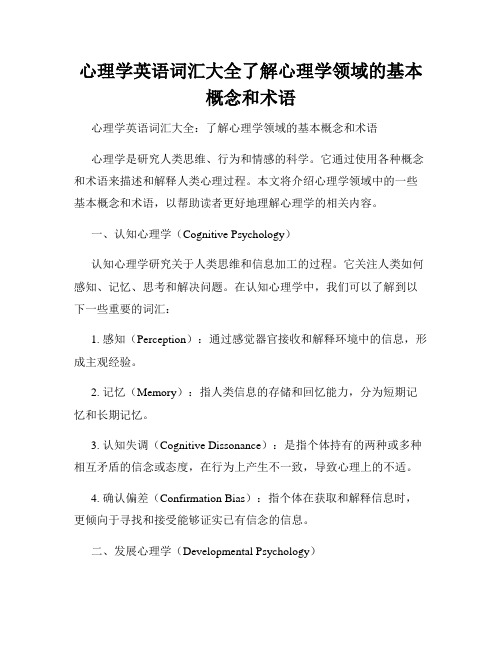
心理学英语词汇大全了解心理学领域的基本概念和术语心理学英语词汇大全:了解心理学领域的基本概念和术语心理学是研究人类思维、行为和情感的科学。
它通过使用各种概念和术语来描述和解释人类心理过程。
本文将介绍心理学领域中的一些基本概念和术语,以帮助读者更好地理解心理学的相关内容。
一、认知心理学(Cognitive Psychology)认知心理学研究关于人类思维和信息加工的过程。
它关注人类如何感知、记忆、思考和解决问题。
在认知心理学中,我们可以了解到以下一些重要的词汇:1. 感知(Perception):通过感觉器官接收和解释环境中的信息,形成主观经验。
2. 记忆(Memory):指人类信息的存储和回忆能力,分为短期记忆和长期记忆。
3. 认知失调(Cognitive Dissonance):是指个体持有的两种或多种相互矛盾的信念或态度,在行为上产生不一致,导致心理上的不适。
4. 确认偏差(Confirmation Bias):指个体在获取和解释信息时,更倾向于寻找和接受能够证实已有信念的信息。
二、发展心理学(Developmental Psychology)发展心理学研究人类从出生到死亡各个阶段的心理和行为变化。
它关注婴儿、儿童、青少年和成年人的发展过程。
以下是一些发展心理学中常用的术语:1. 社会化(Socialization):是指个体学习适应社会的规范和价值观的过程。
2. 成熟(Maturation):指身体和心智随着时间的推移逐渐发展进步,达到最佳状态。
3. 适应性(Adaptation):个体对环境变化做出的心理和生理调整。
4. 分离焦虑(Separation Anxiety):婴儿和幼儿因与主要依赖人分离而出现的不安和恐惧情绪。
三、社会心理学(Social Psychology)社会心理学研究人类如何在社会环境中相互作用,以及个体对他人和群体的态度和行为。
以下是一些社会心理学中常见的概念和术语:1. 自我概念(Self-concept):个体对自我理解和认知的总体观念。
心理学专业词汇(最新整理)

心理学专业词汇(最新整理)1. 心理学(Psychology):研究个体和群体心理过程和行为的学科。
2. 意识(Consciousness):指人类对自身和周围环境的感知和理解。
3. 情感(Emotion):一种主观感受,通常伴随着生理和心理反应。
4. 认知(Cognition):指人类对信息的处理和理解,包括知觉、注意、记忆、思维等。
5. 学习(Learning):通过经验或训练获得知识和技能的过程。
6. 记忆(Memory):将经验和信息储存并在需要时进行提取和回忆的能力。
7. 智力(Intelligence):指个体在解决问题、学习和适应环境方面的能力。
8. 发展心理学(Developmental psychology):研究人类一生中心理过程和行为的变化和发展。
9. 人格(Personality):个体独特的心理特征和行为模式。
10. 社会心理学(Social psychology):研究个体在社会环境中的思维、情感和行为的学科。
11. 临床心理学(Clinical psychology):研究和应用心理学知识,帮助个体解决心理问题和提高心理健康。
12. 心理治疗(Psychotherapy):通过谈话和其他技术方法来解决个体心理问题的过程。
13. 人类发展(Human development):研究个体从出生到死亡的整个生命周期中的物理、认知和情感变化。
14. 注意力(Attention):集中精力和意识的心理过程,用于对外界刺激的选择和加工。
15. 动机(Motivation):驱使人们行为的内在原因和动力。
16. 心理测量(Psychological measurement):使用各种工具和方法来评估个体心理特征和行为。
17. 神经科学(Neuroscience):研究神经系统结构和功能,以及其与心理过程和行为之间的关系。
18. 实验心理学(Experimental psychology):利用实验方法研究心理过程和行为的学科。
常见英语易混淆单词大全
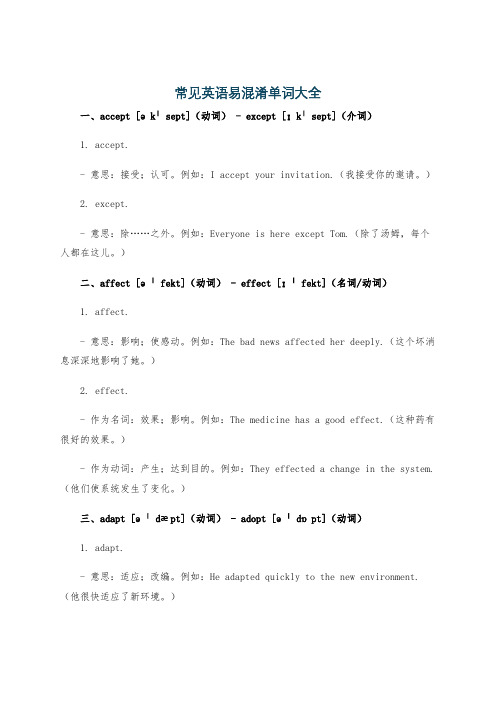
常见英语易混淆单词大全一、accept [əkˈsept](动词) - except [ɪkˈsept](介词)1. accept.- 意思:接受;认可。
例如:I accept your invitation.(我接受你的邀请。
)2. except.- 意思:除……之外。
例如:Everyone is here except Tom.(除了汤姆,每个人都在这儿。
)二、affect [əˈfekt](动词) - effect [ɪˈfekt](名词/动词)1. affect.- 意思:影响;使感动。
例如:The bad news affected her deeply.(这个坏消息深深地影响了她。
)2. effect.- 作为名词:效果;影响。
例如:The medicine has a good effect.(这种药有很好的效果。
)- 作为动词:产生;达到目的。
例如:They effected a change in the system.(他们使系统发生了变化。
)三、adapt [əˈdæpt](动词) - adopt [əˈdɒpt](动词)1. adapt.- 意思:适应;改编。
例如:He adapted quickly to the new environment.(他很快适应了新环境。
)- 例如:They adapted the novel for the film.(他们把这部小说改编成电影。
)2. adopt.- 意思:采用;收养。
例如:We should adopt a new method.(我们应该采用一种新方法。
)- 例如:They decided to adopt an orphan.(他们决定收养一个孤儿。
)四、alive [əˈlaɪv](形容词) - live [lɪv](动词) / [laɪv](形容词)1. alive.- 意思:活着的;有活力的。
只能作表语,不能作定语。
毫厘之差,意义不同:50对易混淆的心理学术语辨析
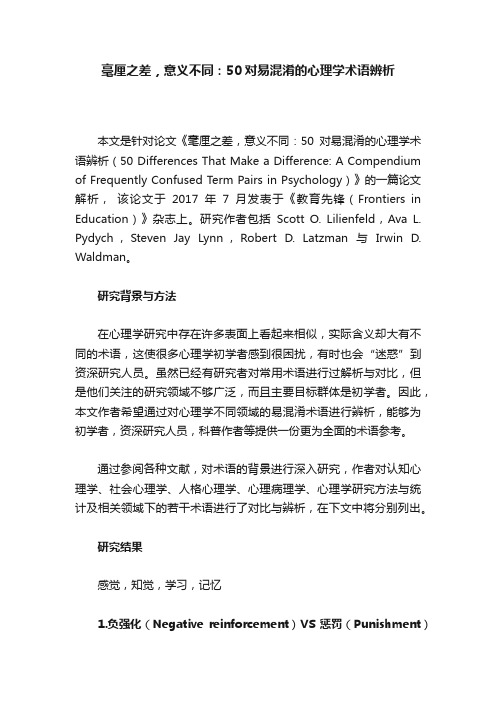
毫厘之差,意义不同:50对易混淆的心理学术语辨析本文是针对论文《毫厘之差,意义不同:50对易混淆的心理学术语辨析(50 Differences That Make a Difference: A Compendium of Frequently Confused Term Pairs in Psychology)》的一篇论文解析,该论文于2017年7月发表于《教育先锋(Frontiers in Education)》杂志上。
研究作者包括Scott O. Lilienfeld,Ava L. Pydych,Steven Jay Lynn,Robert D. Latzman与Irwin D. Waldman。
研究背景与方法在心理学研究中存在许多表面上看起来相似,实际含义却大有不同的术语,这使很多心理学初学者感到很困扰,有时也会“迷惑”到资深研究人员。
虽然已经有研究者对常用术语进行过解析与对比,但是他们关注的研究领域不够广泛,而且主要目标群体是初学者。
因此,本文作者希望通过对心理学不同领域的易混淆术语进行辨析,能够为初学者,资深研究人员,科普作者等提供一份更为全面的术语参考。
通过参阅各种文献,对术语的背景进行深入研究,作者对认知心理学、社会心理学、人格心理学、心理病理学、心理学研究方法与统计及相关领域下的若干术语进行了对比与辨析,在下文中将分别列出。
研究结果感觉,知觉,学习,记忆1.负强化(Negative reinforcement)VS惩罚(Punishment)负强化与惩罚都是行为主义研究的术语。
负强化通过取消或降低厌恶刺激的强度,从而提高个体目标行为出现的概率,惩罚则通过呈现刺激,使目标行为出现的概率下降。
2. 再现(Renewal effect)VS 自发恢复(Spontaneous recovery)两者都是指经典条件反射理论中,条件反应消失后又再现的现象。
再现是指,当建立反射的情境变化后,消失了的条件反应又再现的现象。
熟词僻意总结

词汇词性词义(一般熟意在前,僻意在后)说明action v.起诉,行动 n.情节alpine adj.高山的,阿尔卑斯山的appropriate v.擅用,挪用,占用,盗用aptitude n.天资智能,趋向适合性arrested adj.引人注目的arrested adj.引人注目的article n.物品;制品,商品article n.物品;制品,商品assembly n.会议/立法机构,集合association n.联想,联合协会assume v.承担,担任。
假装,装作…的样子,采取(…态度)assume v.承担,担任;装作…的样子;采取(…态度)band n.乐队bark n.树皮; 三桅帆船bill n.账单;清; 议案,法案; .(水禽等细长而扁平的)嘴〔猛禽的钩状嘴通常叫 beak 〕bill n.议案,法案; (水禽等细长而扁平的)嘴〔猛禽的钩状嘴通常叫 beak 〕book vt.预定,定(戏位、车位等);托运(行李等)build n.骨格,体格,成形cat n.猫科动物catch n.陷阱,圈套,诡计;料不到的困难champion vt.维护,拥护,主张;为…而奋斗。
champion a cause 维护一项事业。
chest n.1) 箱,函,柜,匣2) 银箱;金库,公款,资金climate n.思潮close adj.闷气的,闷热的coach n.长途汽车/私人教师,四轮大马车coat v.涂上一层(例如油漆)compelling n.引人注目的complex n.络合物,复合物,综合体concern n.商行,公司;财团;康采恩;事业,业务condition v.调节construction n.意义释义consume vi.枯萎;憔悴The flowers consumed away.花枯萎了。
be consumed[away]with(envy, fever, ambition, grief)control n.实验对照组convenience adj.(贬)图方便的count n.起诉理由,罪状。
(完整版)考研英语中常用易混淆词汇
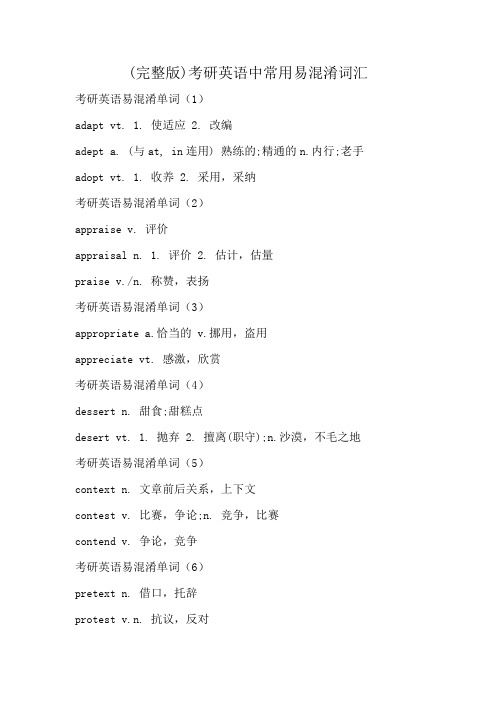
(完整版)考研英语中常用易混淆词汇考研英语易混淆单词(1)adapt vt. 1. 使适应 2. 改编adept a. (与at, in连用) 熟练的;精通的n.内行;老手adopt vt. 1. 收养 2. 采用,采纳考研英语易混淆单词(2)appraise v. 评价appraisal n. 1. 评价 2. 估计,估量praise v./n. 称赞,表扬考研英语易混淆单词(3)appropriate a.恰当的 v.挪用,盗用appreciate vt. 感激,欣赏考研英语易混淆单词(4)dessert n. 甜食;甜糕点desert vt. 1. 抛弃 2. 擅离(职守);n.沙漠,不毛之地考研英语易混淆单词(5)context n. 文章前后关系,上下文contest v. 比赛,争论;n. 竞争,比赛contend v. 争论,竞争考研英语易混淆单词(6)pretext n. 借口,托辞protest v.n. 抗议,反对pretend v. 假装,装作考研英语易混淆单词(7)scare vt. 惊吓;n. 惊恐stare vi. 盯,凝视glare v.n. 1. 闪耀,闪光 2. 怒视,瞪眼flare n. 1. 闪耀 2. (衣裙等)张开3.(感情的)爆发考研英语易混淆单词(8)sparkle vi. 闪耀,发火花spark n. 火花,火星;vi.发火花;vt.引发sprinkle v.喷洒考研英语易混淆单词(9)precious a. 宝贵的,贵重的previous a. 1. 先前的,以前的 2. (to)在……之前考研英语易混淆单词(10)addict vt. 使上瘾addition n.增加addiction n.上瘾考研英语易混淆单词(11)preceding a. 在前的,在先的precede v. 领先,先于,在……之前precedent n. 先例procedure n. 程序,手续,步骤process vt. 加工,处理;n. 1. 过程,进程 2. 工序3.工艺,制作法procession n. 队列,行列proceed vt. 1. 进行,继续(做某事) 2. 发出proceeding n. 1.行动,进行 2. (pl.)会议记录,活动记录考研英语易混淆单词(12)successful a. 成功的successive a. 连续的succession n. 1. 连续,系列 2. 继任,继承(权,次序等) succeed vi. 1. 成功 2. 继承3.接着发生;vt.接替考研英语易混淆单词(13)fossil n. 化石toss v. 1. 抛,扔 2. (使)颠簸,摇摆3.辗转反侧考研英语易混淆单词(14)inhibit v. 抑制, 约束, [化] [医]抑制inhabit vt. 居住于,栖息于inhabitant n. 居民habit n. 习惯,习性habitat n. (动植物的), 产地、栖息地, 聚集处考研英语易混淆单词(15)variable n. 变量;a.易变的variation n. 变化,变动,变异variety n. 1. 多样性 2. 种类various a. 各种各样的考研英语易混淆单词(16)alteration n. 变更,改变alternate v. 交替;a.交替的alternative a. 两者挑一的;n.替换,抉择考研英语易混淆单词(17)convict vt. (以审讯)证明……有罪,宣判……有罪;n. 囚犯conviction n. 1. 深信, 确信 2. 定罪, 宣告有罪convince vt 使确信,使信服考研英语易混淆单词(18)academy n. 学院,协会academic a. 1. 学院的 2. 学术的epidemic n. 流行病;a. 1. 流行性的 2. 传染的考研英语易混淆单词(19)infer v. 推断offer vt. 主动提供;n.提供suffer vt. 遭受,忍受;vi.(from) 1. 受痛苦,患病 2. 受损失transfer vt. 调动,转换;vi. 1. 迁移 2. 转车 2. 转账refer v. 1.(to)查阅,参考 2.(to)提到,引用3.提交,上呈考研英语易混淆单词(20)considerable a. 1. 相当大(或多)的 2. 值得考虑的considerate a. 体谅人的,考虑周到的consideration n. 1. 考虑,思考 2. 体谅,照顾3.需要考虑的事,理由考研英语易混淆单词(21)live vi. 居住,生存;vt.过生活live a. 1. 活的 2. 实况转播的lively a. 1. 活跃的,活泼的 2. 栩栩如生的;ad.快活地,活泼地alive a. 1.活跃的,热闹的 2. 活着的(作表语或后置定语)living a. 活(着)的;n.生计,生活life n. 1. 生命 2. 一生3.生涯,生计4. 生物考研英语易混淆单词(22)exceed vt. 1. 超过,胜过 2. 超出exceedingly ad. 极端地,非常地excess a. 过量的,额外的;n. 1.超过,过多 2.过度,过分excessive a. 过多的,极度的resolution n. 1. 坚定,决心 2. 决定,决议3.解决absolute a. 绝对的,纯粹的dissolve vt. 1. 解除(婚约等) 2. (使)溶解,融化solve vt. 解决,解答salute v. 1. 欢迎 2. 向……打招呼3.敬礼solution n. 1. 解决方法 2. 溶解,溶液soluble a. 可溶的resolute a. 坚决的,果断的resolve v. 决定,决定;n. 1. 解决,解答 2. 决心,决定3.决议swift a. 快速的,敏捷的;ad.快速地drift v.n. 漂,漂流shaft n. 轴,杆状物shift n. 1. 转换 2. (轮或换)班;v. 1. 移动 2. 替换,转换。
心理学的术语

心理学的术语【心理学的术语】【引言】心理学是一门关于人类心理活动及其规律的科学,它研究人类思维、情感、行为等方面的现象和过程。
心理学的研究领域广泛,因此涉及的术语也众多。
本文将介绍几个常见的心理学术语,帮助读者更好地理解和运用心理学知识。
【第一部分:认知偏差】认知偏差是指人类由于认知能力有限,对信息的处理往往具有主观性和片面性。
其中,常见的认知偏差有选择性感知、注意偏见、归因偏差等。
选择性感知是指个体在面对大量信息时,倾向于选择和注意那些与自身态度和价值观一致的信息,而忽视与之相悖的信息。
这种偏向性可能导致人们的观点更加固化,不容易改变。
注意偏见是指人们在注意和处理信息时,偏向于选择那些与自己关注点相关的信息,而忽视其他重要的信息。
这种偏见可能导致信息的片面性和不全面性。
归因偏差是指人们在解释行为原因时,倾向于将成功归因于内部因素(如个人能力、努力等),而将失败归因于外部因素(如环境、他人等)。
这种偏差可能造成对他人的误解或误判。
【第二部分:情绪与压力】情绪是人们对特定事件或刺激所产生的主观体验,而压力则是人们在应对环境需求时所面临的身心压力反应。
在心理学中,情绪和压力相关的术语有情绪调节、压力疲劳、情绪智力等。
情绪调节是指个体对自身情绪的感知、表达和调控能力。
它涉及到情绪的认知、体验、表达和调节等方面,对个体的心理健康和人际关系具有重要影响。
压力疲劳是指长期面临压力和紧张状态时,个体出现的身心疲惫、情绪低落、注意力不集中等问题。
压力疲劳对个体的身心健康造成负面影响,需要进行适当的压力管理和放松。
情绪智力是指个体对情绪的感知、理解、利用和管理的能力。
情绪智力包括对自身情绪的认知和调控,以及对他人情绪的理解和适当回应。
情绪智力可以提高个体的适应能力和人际关系质量。
【第三部分:心理障碍】心理障碍是指个体在心理活动中出现异常,影响其正常生活和功能的一种心理状态。
心理障碍包括抑郁症、焦虑症、强迫症等。
抑郁症是一种常见的心理障碍,主要表现为情绪低落、失去兴趣、睡眠和食欲改变等症状。
心理学专业词汇(最新整理)
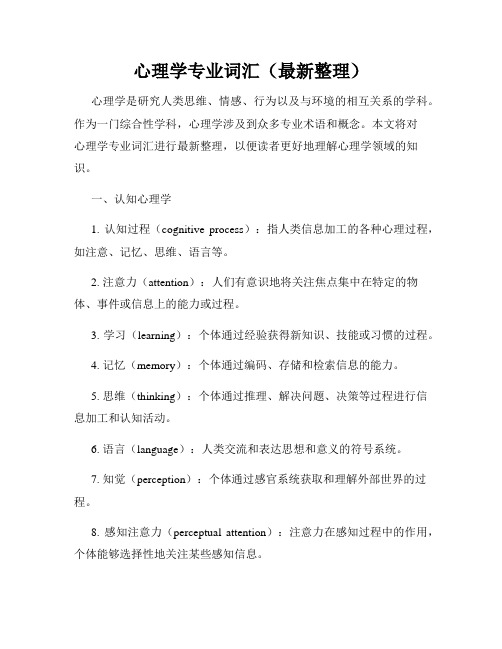
心理学专业词汇(最新整理)心理学是研究人类思维、情感、行为以及与环境的相互关系的学科。
作为一门综合性学科,心理学涉及到众多专业术语和概念。
本文将对心理学专业词汇进行最新整理,以便读者更好地理解心理学领域的知识。
一、认知心理学1. 认知过程(cognitive process):指人类信息加工的各种心理过程,如注意、记忆、思维、语言等。
2. 注意力(attention):人们有意识地将关注焦点集中在特定的物体、事件或信息上的能力或过程。
3. 学习(learning):个体通过经验获得新知识、技能或习惯的过程。
4. 记忆(memory):个体通过编码、存储和检索信息的能力。
5. 思维(thinking):个体通过推理、解决问题、决策等过程进行信息加工和认知活动。
6. 语言(language):人类交流和表达思想和意义的符号系统。
7. 知觉(perception):个体通过感官系统获取和理解外部世界的过程。
8. 感知注意力(perceptual attention):注意力在感知过程中的作用,个体能够选择性地关注某些感知信息。
9. 判断决策(judgment and decision making):个体在面临选择时的思考、评估、决策的过程。
10. 问题解决(problem solving):个体在面对难题或挑战时通过思考和策略来找到解决办法。
二、发展心理学1. 儿童发展(child development):研究人类从婴幼儿期到青少年期各个阶段的生理、认知和社会发展过程。
2. 青少年发展(adolescent development):研究人类从儿童期到成年期的过渡阶段,包括身体、认知和社会发展的变化。
3. 社会性别(gender):指在特定社会和文化背景下,男性和女性所具有的角色和行为特征。
4. 发展障碍(developmental disorders):指发展过程中出现的异常或延迟,如自闭症、学习障碍等。
易混淆丨20组常见的易混淆的英语单词,不要再弄错啦!
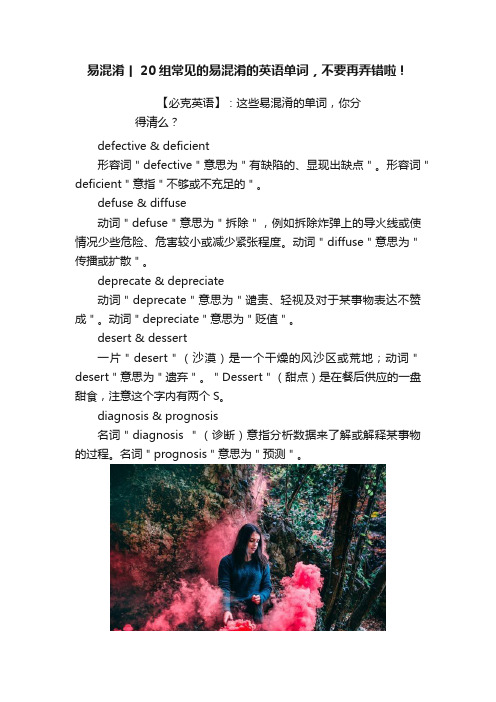
易混淆丨20组常见的易混淆的英语单词,不要再弄错啦!【必克英语】:这些易混淆的单词,你分得清么?defective & deficient形容词"defective"意思为"有缺陷的、显现出缺点"。
形容词"deficient"意指"不够或不充足的"。
defuse & diffuse动词"defuse"意思为"拆除",例如拆除炸弹上的导火线或使情况少些危险、危害较小或减少紧张程度。
动词"diffuse"意思为"传播或扩散"。
deprecate & depreciate动词"deprecate"意思为"谴责、轻视及对于某事物表达不赞成"。
动词"depreciate"意思为"贬值"。
desert & dessert一片"desert"(沙漠)是一个干燥的风沙区或荒地;动词"desert"意思为"遗弃"。
"Dessert"(甜点)是在餐后供应的一盘甜食,注意这个字内有两个S。
diagnosis & prognosis名词"diagnosis "(诊断)意指分析数据来了解或解释某事物的过程。
名词"prognosis"意思为"预测"。
discreet & discrete形容词"discreet"意为"谨慎地自我克制"。
"Discrete"意指"截然不同的"或"分离的"。
请特别注意这两个字的拼法。
disinterested & uninterested形容词"disinterested"意思为"公正无私与不带偏见的"。
"Uninterested"意指漠不关心或满不在乎的。
dual & duel形容词"dual"意指两个或双重;"duel"可当名词或动词使用,指的是一场决斗或斗争。
elicit& illicit动词“elicit”意指“唤起”或“显示出”;形容词“illicit”的意思为“非法的”或“不允许的”。
eminent& imminent形容词“eminent”意思为“显眼的”或“杰出的”。
心理学常考的英文名词解释

心理学常考的英文名词解释在心理学常考的英文名词中,有许多重要且具有深度的概念,这些概念涉及到人类思维、行为和情绪等方面。
在本篇文章中,我们将探讨其中一些常见的英文名词,并对其进行解释,帮助读者更好地理解和掌握这些概念。
1. Perception(知觉)Perception是指通过感觉器官对外部刺激进行信息加工和解释的过程。
在知觉过程中,人们通过感觉器官(如眼睛、耳朵、皮肤)接收外部刺激,并将其转化为可理解的感知经验。
这种经验的形成是由感官刺激、个体的经验和知识以及环境因素相互作用所决定的。
知觉在认知过程中扮演着重要的角色,它影响了我们对世界的理解和感知。
2. Attention(注意力)Attention是指个体有意识地将注意力集中在某个特定的对象或刺激上的能力。
人类的注意力有限,我们需要选择性地将注意力集中在某些特定的刺激上,而忽略其他的刺激。
注意力的变化有助于我们处理复杂的信息,并且能够提高认知和行为的效果。
不同的注意力分配方式会对认知和情绪产生不同的影响,因此,对于不同任务和环境,合理地管理注意力是非常重要的。
3. Memory (记忆)Memory是指人类对过去经历的信息和经验的存储和回忆能力。
记忆可以分为短期记忆和长期记忆两种类型。
短期记忆是临时存储信息的能力,它有限且容易消失,而长期记忆则是持久存储信息的能力,它的容量和时效性较大。
记忆对于认知和学习至关重要,它使我们能够在新的环境中快速适应和利用以往的经验。
4. Emotion (情绪)Emotion是指个体对内外刺激产生的、带有主观感受的生理和心理反应。
情绪通常包括愉快和不愉快的心理状态,如快乐、悲伤、愤怒和害怕等。
情绪对我们的认知、行为和健康产生深远的影响。
通过情绪的表达和感受,我们可以更好地理解自己和他人,也可以调节自己的行为和对世界的态度。
5. Intelligence(智力)Intelligence是指个体理解和适应环境、解决问题和学习新知识的能力。
学者倡议:这100个心理学术语,不要再滥用了!
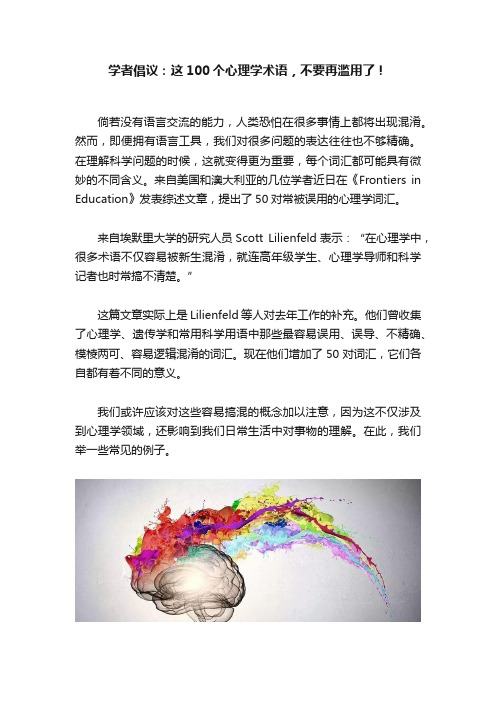
学者倡议:这100个心理学术语,不要再滥用了!倘若没有语言交流的能力,人类恐怕在很多事情上都将出现混淆。
然而,即便拥有语言工具,我们对很多问题的表达往往也不够精确。
在理解科学问题的时候,这就变得更为重要,每个词汇都可能具有微妙的不同含义。
来自美国和澳大利亚的几位学者近日在《Frontiers in Education》发表综述文章,提出了50对常被误用的心理学词汇。
来自埃默里大学的研究人员Scott Lilienfeld表示:“在心理学中,很多术语不仅容易被新生混淆,就连高年级学生、心理学导师和科学记者也时常搞不清楚。
”这篇文章实际上是Lilienfeld等人对去年工作的补充。
他们曾收集了心理学、遗传学和常用科学用语中那些最容易误用、误导、不精确、模棱两可、容易逻辑混淆的词汇。
现在他们增加了50对词汇,它们各自都有着不同的意义。
我们或许应该对这些容易搞混的概念加以注意,因为这不仅涉及到心理学领域,还影响到我们日常生活中对事物的理解。
在此,我们举一些常见的例子。
asocial 和 antisocial我们有时会用“antisocial(反社会的)”一词来形容怕羞和内向的人,实际上这个词有着更为阴暗的意味。
因为反社会行为常常伴随着不计后果、伤害他人的举动。
而对于内向的,喜欢宅在家里,不愿意过多与他人接触的人,应该用“asocial(不合群的)”来形容。
对于新来的腼腆同事,一般也可用asocial来形容。
psychopath 和 sociopathPsychopath(精神病患者)和sociopath(反社会者)。
前者是一种可诊断的人格障碍,后者则并不是这样。
negative reinforcement 和 punishmentNegative reinforcement(负强化)是指去掉一个负面的刺激,从而增加某种行为的出现。
比如婴儿吸吮手指时,给与持续批评。
一旦不再吃手指头,便立即停止批评。
直到其不再吃手;Punishment (惩罚)则是施加一个负面刺激,从而减少某种行为的出现。
- 1、下载文档前请自行甄别文档内容的完整性,平台不提供额外的编辑、内容补充、找答案等附加服务。
- 2、"仅部分预览"的文档,不可在线预览部分如存在完整性等问题,可反馈申请退款(可完整预览的文档不适用该条件!)。
- 3、如文档侵犯您的权益,请联系客服反馈,我们会尽快为您处理(人工客服工作时间:9:00-18:30)。
AP Psychology Exam Review Sheet
“Confusing Pairs”
Independent Variable (what is tested) v. Dependent Variable (what is measured)
Experimental Group (group that is tested) v. Control Group (compared to the experimental, receives the placebo in a drug experiment.
Left brain (language and logic) v. Right brain (creative and spatial).
Corpus Callosum (divides the brain) v. Cerebral Cortex (covers the brain)
Sympathetic Nervous System (“fight or flight”) v. Parasympathetic (calming – parachute) Neurotransmitters (in the nervous system) v. Hormones (in the endocrine system)
Lateral Hypothalamus (stimulates hunger) v. Ventromedial Hypothalamus (suppresses hunger)
Broca’s Area (makes words) v. Wernicke’s Area (comprehends words)
Identical Twins (same fertilized egg) v. Fraternal Twins (two separate eggs)
Afferent neurons (sensory, body to brain) v. Efferent neurons (motor, brain to body)
Assimilation (all four-legged animals are “doggies”… category is already set up) v. Accommodation (“doggies” are different than “kitties”…so, it is new information, a new category will be set up)
Concrete operations (logical thinking) v. Formal operations (philosophical thinking)
Sensation (bottom-up processing) v. Perception (top-down processing)
Rods (night vision) v. Cones (color vision)
Classical conditioning (involuntary) v. operant conditioning (voluntary)
Primacy effect (first items remembered) v. Recency effect (last items remembered)
Proactive interference (loss of the new info) v. retroactive (loss of the old info)
Implicit memory (non-declarative; skills) v. Explicit memory (declarative, facts)
Recall memory (no cues) v. Recognition memory (some hints)
Algorithms (step-by-step) v. Heuristics (rule-of-thumb)
Representative heuristics (stereotypes) v. Availability heuristics (based on available info)
Phonemes (basic sound units) v. Morphemes (basic units of meaning)
Fluid Intelligence (processing speed) v. Crystallized Intelligence (acquired knowledge)
Validity (test measures what it should) v. Reliability (same scores on a retest)
Achievement test (what you’ve learned) v. Aptitude test (potential)
Intrinsic motivation (for personal satisfaction) v. Extrinsic motivation (for rewards)
Theory Y (democratic/intrinsic) v. Theory X (rewards or punishment/extrinsic)
Internal locus (you control the environment) v. External locus (environment controls you)
Lithium (treats bi-polar) v. Librium (treats anxiety)
Type A (high stress) v. Type B (low stress)。
